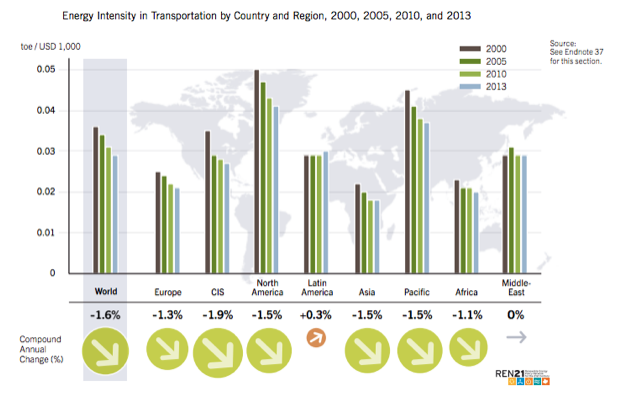REN21 Report: Renewable Energy in the Transport Sector Remains Small
The Renewable Energy Policy Network for the 21st Century (REN21) has published the Renewables Global Status Report (GSR) to assess the current renewable energy market, industry, and policy trends in order to facilitate knowledge exchange, policy development, and joint action towards a rapid global transition to renewable energy. The report shows that the share of renewables in transportation remains small and despite multiple potential entry points for renewable energy in the transportation sector, development has been limited, and the primary focus of policies, markets, and industries has been on liquid biofuels. Nonetheless, the electrification of the transport sector expanded further during 2014.
There has been a rising awareness worldwide that renewable energy and energy efficiency are critical not only for addressing climate change, but also for creating new economic opportunities and for providing energy access to the billions of people still living without modern energy services.

Source: REN21
The share of renewables in transportation remains small. Renewable energy accounted for an estimated 3.5% of global energy demand for road transport in 2013, up from 2% in 2007. Liquid biofuels—primarily ethanol and biodiesel—represent the vast majority of the renewable share.
Despite multiple potential entry points for renewable energy in the transportation sector, development has been limited, and the primary focus of policies, markets, and industries has been on liquid biofuels. Advances in new markets and in applications for biofuels—such as commercial flights being fueled by aviation biofuel—continued in 2014. Relatively small but increasing quantities of gaseous biofuels, including biomethane, also are being used to fuel vehicles.
On the other hand, increased electrification of trains, light rail, trams, and both two- and four-wheeled electric vehicles is creating greater opportunities for the integration of renewable energy into transport. The electrification of the transport sector expanded further during 2014. The number of electric passenger vehicles on the road nearly doubled from 350,000 in 2013 to 665,000 in 2014. As of early 2015, China was home to 97% of the world’s 235 million electric two wheelers and 79% of the world’s 46,000 electric buses. These trends enable greater integration of renewable energy into the transport sector, but only to the extent that the associated electricity demand is met with new renewables, as electric vehicles are only as “renewable” as their power source.
The majority of transport-related policies continued to focus on the biofuel sector and on road transport, although other modes of transportation also are attracting attention. Policies promoting the linkage between electric vehicles and renewable energy have received little focus to date. As of early 2015, biofuel blend mandates were in place in 33 countries, with 31 national mandates and 26 state/provincial mandates. A number of countries strengthened existing blend mandates in 2014; however, the debate over the sustainability of first-generation biofuels continued.
Policy support for renewables has contributed to a growth in market volume and to strong global competition. Significant cost reductions, especially for solar PV and wind power, have played a part in the increasing electrification of transportation and heating applications, highlighting the potential for further overlap among the sectors in the future.
For more information, please go here.